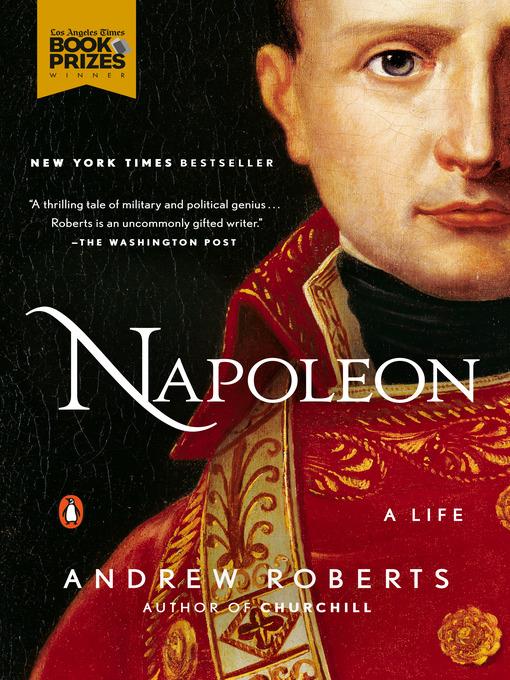
Napoleon
A Life
کتاب های مرتبط
- اطلاعات
- نقد و بررسی
- دیدگاه کاربران
نقد و بررسی

October 6, 2014
Military historian Roberts (The Storm of War) examines Napoleon Bonaparte’s life and times in excruciating detail, leaving out little, if anything, of consequence that happened to the legendary general and ruler of France during his 52 years. Roberts moves from Napoleon’s obscure Corsican origins to his meteoric rise to power, through his fraught personal relationships and his numerous military campaigns, to his sad and ignominious exile on St. Helena, where he died of stomach cancer. Basing his conclusions on a vast trove of Napoleon’s published letters and other contemporary sources, along with personal visits to 53 of 60 battlefields that figured in Napoleon’s career, Roberts argues that Napoleon was not only a brilliant military strategist but also a great statesman and a true intellectual. A micromanager, Napoleon effectively “compartmentaliz his life” to achieve success in both political and military realms—although less so with his wives and mistresses. “Napoleon represented the Enlightenment on horseback,” Roberts writes, describing his coronation as Emperor of France as “a defining moment” of the Enlightenment. He contends that Napoleon’s downfall was due to a combination of unforeseeable circumstances and “a handful of significant miscalculations,” including the invasion of Russia. This is a definitive account that dispels many of the myths that surrounded Napoleon from his lifetime to the present day. Maps. Agent: Georgina Capel, Capel & Land.

October 1, 2014
More books have been written with Napoleon (1769-1821) in the title than there have been days since his death, writes prolific historian and Napoleonic Institute fellow Roberts (The Storm of War: A New History of the Second World War, 2011, etc.) in this 800-page doorstop. Entirely conventional and mostly admiring, it fills no great need, but few readers will complain. After his early years in the backwater of Corsica, Napoleon's influential father sent him to France at the age of 9 to learn French and be educated in an elite military academy. An obscure officer when the revolution broke out in 1789, he left his post to spend most of those years in a complex factional struggle in Corsica, which he ultimately lost. He fled to France in 1793, a penniless but fiercely ambitious artillery captain. Six years later, already a national hero after a brilliant campaign in Italy, he engineered a coup that made him dictator. For the next 15 years, except for a brief armistice, his armies rampaged through Europe, mostly crushing opposing forces until he overreached in Spain and Russia and went down to defeat and humiliating exile. "Although his conquests ended in defeat and ignominious imprisonment," writes the author, "over the course of his short but eventful life he fought sixty battles and lost only seven. For any general, of any age, this was an extraordinary record." Readers will find this book to be a long but mostly pleasant reading experience, although some will doubt that Napoleon "saved the best aspects of the Revolution, discarded the worst, and ensured that even when the Bourbons were restored they could not return to the Ancient Regime." Other opinionated observers-Paul Johnson, Charles Esdaile, Alan Schom-consider Napoleon a self-absorbed opportunist plagued by his incompetent economics, pugnacious foreign policy, totalitarian government and massive propaganda, but Roberts offers a solid reconsideration.
COPYRIGHT(2014) Kirkus Reviews, ALL RIGHTS RESERVED.

Starred review from October 15, 2014
Military historian Roberts (Lehrman Inst. Distinguished Fellow, New-York Historical Soc.; Napoleon and Wellington) revisits the subject of a former work with a compelling biography of the preeminent French general Napoleon Bonaparte (1769-1821) that stands apart from the rest owing to the author's thoroughness, accuracy, and attention to detail. Roberts relies on his military expertise, Napoleon's surviving correspondence (33,000 items in all), and exhaustive on-site studies of French battlegrounds during the Hundred Days to carefully describe what each battle, including the Waterloo Campaign and the Neapolitan War, must have been like for victors and losers. In the process, he deflates many of the myths that still surround the emperor nearly 200 years after his final defeat at Waterloo in 1815. The author doesn't apologize for Napoleon's errors but the tone of his study is positive: Napoleon "personified the best parts of the French Revolution" and his example and military reforms impacted not only European life but had lasting consequences on how contemporary wars are fought. VERDICT This voluminous work is likely to set the standard for subsequent accounts of Napoleon's life. It should appeal widely to readers of all types. [See Prepub Alert, 6/2/14.]--David Keymer, Modesto, CA
Copyright 2014 Library Journal, LLC Used with permission.

November 15, 2014
Next year will be the 200th anniversary of the Battle of Waterloo, so a massive, single-volume biography of Napol'on is, perhaps, appropriate, especially given the recent release of more than 33 thousand of Napol'on's letters. Although there was hardly a shortage of primary source material on Napol'on and his era, Roberts, a prizewinning historian and fellow of the Napoleonic Institute, has effectively used these new sources to offer some interesting and probably controversial perspectives on the man, his career, and his lasting impact. In a cradle-to-grave format, Roberts devotes some pages to Napol'on's Corsican boyhood and his difficult years in a French military academy. But the strength of the narrative emphasizes his brilliance as a military commander and his lasting political reforms in France. Unfortunately, Roberts' admiration for Napol'on, which borders on idolatry, leads him to minimize or even ignore his subject's unsavory personal qualities and actions, including his ego-driven selfishness, his willingness to abandon friends when it suited his advancement, and even his leaving his soldiers to face their fate without him in Egypt and Russia. This is a well-researched, absorbing, but unbalanced biography of a historical giant.(Reprinted with permission of Booklist, copyright 2014, American Library Association.)

























دیدگاه کاربران